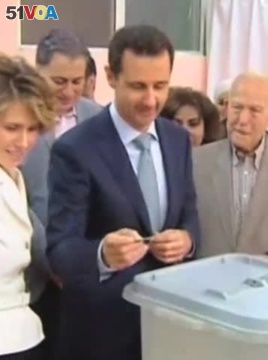June 04,2014
STATE DEPARTMENT — Syrian President Bashar al-Assad has won re-election in a vote held in government-controlled parts of his war-torn country.
U.S. officials dismiss his re-election as a farce.

"We have a Syrian regime that is going to dig in, is going to insist on its legitimacy. That view will be supported by Russia, Iran, China, other governments which have backed the Assad regime," said Heydemann. "And it means that any opportunity to try to close the gap and move the conflict toward a negotiated settlement has been significantly set back.
Iranian support for Assad in this vote included election observers.
Alaeddin Boroujerdi, who heads Iran's Parliamentary Committee for National Security, said, "Syrian people participated completely freely in these elections, and foreign and regional campaigns aiming at misleading the facts did not succeed in preventing Syrian people from practicing their right to choose their leadership.
Former U.S. ambassador Adam Ereli said the vote helps Iran to broaden its regional standing.
"That's why Iran is active in Syria. It is a defensive move, in other words, keep your ally in power so their opponents don't. But it also maximizes Iranian influence.
A stronger Assad is partly the result of what former U.S. Ambassador to Syria Robert Ford calls a failed U.S. policy.
"We need, and we have long needed, to help moderates in the Syrian opposition with both weapons and other non-lethal assistance," said Ford. "Had we done that a couple of years ago, had we ramped it up, frankly the al-Qaida groups that have been winning adherents would have been unable to compete with the moderates.
State Department Deputy Spokeswoman Marie Harf said the Obama administration is boosting support for the opposition.
"I think actually a lot of the frustration you’ve heard people like Ambassador Ford talk about is that the situation is incredibly complicated and there are no easy answers, and that we are constantly looking at ways to increase our support," she said. "We are constantly looking at ways to get the parties back to the table.
But Heydemann said getting Assad, with his new electoral mandate, back to the negotiating table is far harder without a credible military threat.
"If the regime feels that it has won militarily, if it feels that its survival is now ensured, if, because of Iranian support and Russian support and the participation of Hezbollah, it no longer views the opposition as a threat, then its incentives to negotiate disappear," he said.
Heydemann said the Obama administration has the opportunity to boost military support for the armed opposition, but so far has been unwilling to do so in a way that would change Assad's calculus.